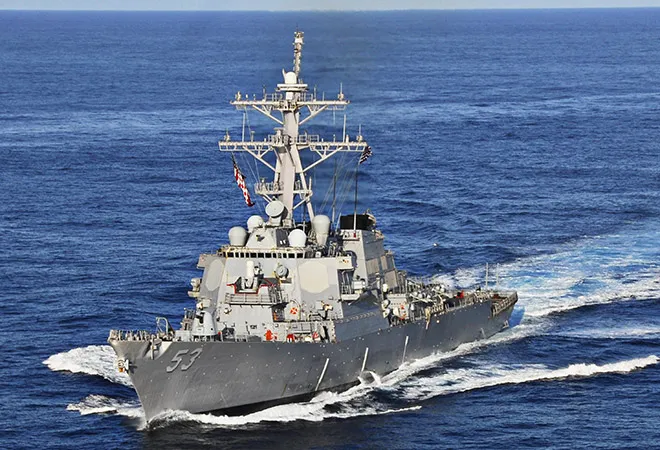India’s strategic community was agitated last week when the
USS John Paul Jones carried out a freedom of navigation operation (FONOP) 130 nautical miles west of the Lakshadweep Islands. Indian observers reacted with shock and dismay at what some described as an unnecessary provocation by the U.S. Navy. The disquiet in Delhi was heightened by an unusual press release by the Commander, U.S. 7th Fleet, that said the operation, which was carried out in India’s exclusive economic zone (EEZ), “asserted navigational rights and freedoms... without requesting India’s prior consent”. Many saw this as political signalling by the U.S., oddly, at a time when U.S.-India relations are on a high.
Different interpretations
In the aftermath of the incident, the U.S. Pentagon defended the military operation off India’s waters terming it “consistent with international law”. For the U.S. Navy, FONOPs are a way of showing that the maritime claims of certain states are incompatible with international law. India’s requirement of prior consent for the passage of foreign warships through Indian EEZs, U.S. officials believe, is a violation of the United Nations Convention on the Law of the Sea (UNCLOS). Articles 56 and 58,
Part V of the Law of the Sea, they point out, entitle U.S. warships to high-seas freedoms in the 200-nautical mile EEZs of another coastal state.
India interprets the maritime convention differently. Indian experts note that the UNCLOS does not explicitly permit the passage of military vessels in another state’s EEZ. When it ratified the convention in 1995, New Delhi stated, “India understands that the provisions of the Convention do not authorize other States to carry out in the exclusive economic zone and on the continental shelf military exercises or manoeuvres, in particular those involving the use of weapons or explosives without the consent of the coastal State.” This position is consistent with India’s domestic law — the Territorial Waters, Continental Shelf, Exclusive Economic Zone and Other Maritime Zones of India Act of 1976 — and remains unchanged.
Despite disagreements over navigational freedoms, however, India and the U.S. have refrained from a public airing of differences. Indian observers have come to accept U.S. FONOPs as an instrument in Washington’s military and diplomatic toolkit that gives the U.S. Navy leverage in the contest with China in the South China Sea. U.S. officials, too, have learnt to take Indian posturing in their stride. Washington knows New Delhi’s real concern is the possibility of greater Chinese naval presence in Indian waters, in particular the threat of People’s Liberation Army Navy submarines near Indian islands. Delhi’s pronouncements on foreign military activity in Indian EEZs, they know, don’t need to be taken literally.
Needless to say, U.S. FONOPs in Indian EEZs have been relatively low key, serving mainly to check a box on the U.S. Navy’s record of activity in Asia. Since 2016, the U.S. Navy has carried out three forays through Indian EEZs keeping well outside Indian territorial waters. In contrast, U.S. warships challenged excessive Chinese claims thrice in 2016, four times in 2017, six in 2018, eight in 2019, and nine in 2020. Most patrols are said to have come within 12 nautical miles of the territorial sea limit around China’s islands. Those statistics say something about the U.S. Navy’s strategic priorities in Asia.
Lakshadweep: A smart choice
The choice of Lakshadweep for the FONOP doesn’t seem incidental. U.S. planners are likely to have known that a U.S. naval foray close to the ‘strategic’ Andaman and Nicobar Islands would be controversial. Besides necessitating a response from New Delhi, it could have exposed a wrinkle in the relationship that both sides have so far been discreet about: the disagreement over interpretation of the UNCLOS. U.S. planners are likely to have calculated that a naval operation in the waters off Lakshadweep would be unremarkable. With maritime boundaries around the Lakshadweep more settled than the Andaman and Nicobar Islands (where straight baselines on the Western edge of the islands have in the past raised uncomfortable questions), Indian officials could even afford to ignore the operation.
To guard against any misreading of intent, the U.S. Navy coupled its FONOP in Indian waters with another sail through the territorial seas of the Maldives, a country with which the U.S. signed a defence agreement in 2020. The idea, ostensibly, was to signal to China that the U.S. Navy is committed to uphold the rules-based order in the waters of opponents and partners alike. Alas, the U.S. 7th Fleet erred in releasing a press statement that set the issue ablaze. Once social media picked up the story, it took on a life of its own.
Bridging the divide
There are lessons for both India and the U.S. from l’affaire Lakshadweep. The U.S. must recognise that FONOPs have implications for New Delhi that go beyond the infringement of Indian jurisdiction in the near seas. Such operations normalise military activism close to India’s island territories that remain vulnerable to incursions by foreign warships. The U.S. Navy’s emphasis on navigational freedoms in the EEZs encourages other regional navies to violate India’s domestic regulations in the waters surrounding the Andaman and Nicobar Islands. U.S. hectoring on the subject isn’t acceptable as Washington is yet to ratify the UNCLOS.
But New Delhi, too, must rethink its stand on freedom of navigation in the EEZs. It isn’t enough for Indian officials and commentators to say U.S. FONOPs are an act of impropriety. The reality is that India’s domestic regulation is worryingly out of sync with international law. India’s declaration of straight baselines delineating zones around the Andaman and Nicobar Islands (on the Western edge), in particular, is a discrepancy that cannot be explained as a minor departure from the provisions of the UNCLOS.
The U.S. Navy sail through the waters off Lakshadweep highlights a gap in the Indian and American perception of navigational freedoms, complicating an already complex domain of international maritime law. Yet it is not the betrayal of a friend that many have sought to portray the FONOP to be.
This commentary originally appeared in The Hindu.
The views expressed above belong to the author(s). ORF research and analyses now available on Telegram! Click here to access our curated content — blogs, longforms and interviews.

